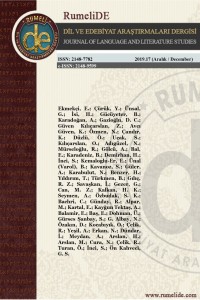The research of the terms of ‘death’ and ‘destiny’ in the story named “Nedda” of Giovanni Verga, the representative of Italian realism
Abstract
Verga, born in Sicily in 1840, is one of the most important writers that contributes to the nativity and progress of Verism in Italy observing Sicily’s people, their life, the conditions and the misery of them. He wants to find an inspiration in their honest and pure life. One of the most realist stories of Verga is “Nedda”. Nedda, the protagonist of the story, is a poor girl that surrenders always to her destiny. To find the money required for the medicines of her ill mother she goes to work far away. When she turns back, soon her mother dies. She feels grateful about her death because she thinks that her mother is safe now and she won’t have to work for her. As she continues to work for herself, she falls in love with Janu, a young poor boy and gets pregnant. But Janu is ill. Just before they get married, one day while he’s working, he dies because of malaria. Nedda is all alone now, she gives birth but because of misery she can’t feed enough her baby that also dies in a few days. Nedda is grateful again for this lost also, she doesn’t want her baby to suffer in misery like herself. For Nedda life means suffering and death is the only way to get rid of this pain and misery. The aim of this study is to research with examples the terms of ‘death’ and ‘destiny’ in Verga’s story named “Nedda”.
References
- Capuana, L. (1972). Verga e d’Annunzio, Bologna: Edizioni Cappelli. Momigliano, A. (1923). Giovanni Verga Narratore, Palermo: Gaetano Priulla Editore. Öncel, S. (1971). Aspetto sociale ed umano dell’arte verghiana, Ankara: A.Ü. DTCF. Öncel, S. (1998). İtalyan Edebiyat Tarihi. 2. Kitap, Ankara: Ankara İtalyan Kültür Heyeti. Pazzaglia, M. (1988). Antologia della letteratura italiana, Vol. 3, Bologna: Zanichelli. Ramat, R. (1945). Ragionamenti morali e letterari, Bari: Macrì. Verga, G. (1959). Seçme Hikayeler, çev. Feridun Timur, İstanbul: Milli Eğitim Bakanlığı, Maarif. Tonelli, L. (1927). L’opera di Giovanni Verga, Catania: Studio editoriale moderno.
İtalyan gerçekçiliğinin temsilcisi Giovanni Verga’nın “Nedda” adlı öyküsünde ölüm ve kader kavramlarının incelenmesi
Abstract
1840 yılında İtalya’nın Sicilya adasında dünyaya gelen Giovanni Verga, doğduğu bölgedeki yaşam koşullarını, bölge insanlarının yoksulluğunu ve bu yaşam koşullarına boyun eğişlerini ele alan bir yazar olmuştur. Yazar bölgedeki güç ve acı dolu, dürüst ve sade yaşamlarda kendine esin kaynağı bulmaya çabalamıştır. Tüm bu örnekler karşısında Verga’nın yazdığı ilk gerçekçi öykülerinden biri sayılabilen “Nedda”dır. Öykünün başkahramanı olan Nedda, yoksul ve kaderine boyun eğmeye alışmış bir genç kızdır. Hasta bir annesi olan Nedda, onun ilaç masraflarını karşılamak için uzaklara çalışmaya gider, hafta sonu eve döndüğünde ise annesini kaybeder. Onun ölümü ile acılarından kurtulduğunu düşünen Nedda teselli bulur; geçinmek için çalışmaya devam eder. Bu kez Janu adlı bir gençle tanışır, evlenmeden hamile kalır, Janu’nun da sıtmadan ölmesi Nedda’yı derinden etkiler, yapayalnız kalmış ve evlilik dışı çocuk dünyaya getireceğinden toplumdan dışlanmıştır, çelimsiz bir bebek dünyaya getirir, ancak maddi koşullarının yetersizliği nedeniyle bebeği gerektiği gibi besleyemez ve onu da kaybeder. Nedda adeta onun ölümüne sevinir, kendisi gibi acı içerisinde yaşamasını istemez, bu yüzden bu kaderinden ötürü Tanrı’ya şükreder. Yaşam acı çekmekten ibarettir, ölüm ise bu acı ve yoksulluktan kurtulmak anlamına gelir. Bu çalışmada Verga’nın bu öyküsünde ‘ölüm’ ve ‘kader’ kavramlarını nasıl ele aldığı örneklendirmelerle irdelenmiştir.
Keywords
References
- Capuana, L. (1972). Verga e d’Annunzio, Bologna: Edizioni Cappelli. Momigliano, A. (1923). Giovanni Verga Narratore, Palermo: Gaetano Priulla Editore. Öncel, S. (1971). Aspetto sociale ed umano dell’arte verghiana, Ankara: A.Ü. DTCF. Öncel, S. (1998). İtalyan Edebiyat Tarihi. 2. Kitap, Ankara: Ankara İtalyan Kültür Heyeti. Pazzaglia, M. (1988). Antologia della letteratura italiana, Vol. 3, Bologna: Zanichelli. Ramat, R. (1945). Ragionamenti morali e letterari, Bari: Macrì. Verga, G. (1959). Seçme Hikayeler, çev. Feridun Timur, İstanbul: Milli Eğitim Bakanlığı, Maarif. Tonelli, L. (1927). L’opera di Giovanni Verga, Catania: Studio editoriale moderno.
Details
| Primary Language | Turkish |
|---|---|
| Subjects | Creative Arts and Writing |
| Journal Section | Turkish language, culture and literature |
| Authors | |
| Publication Date | December 21, 2019 |
| Published in Issue | Year 2019 Issue: 17 |

